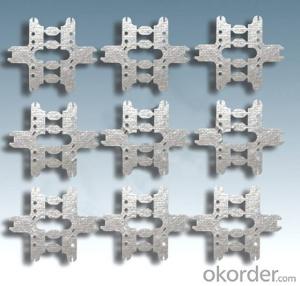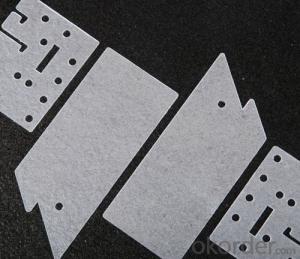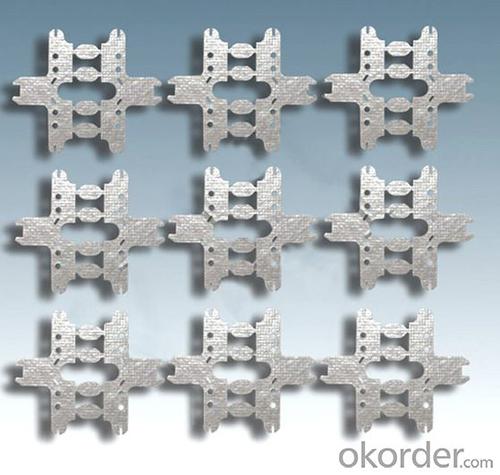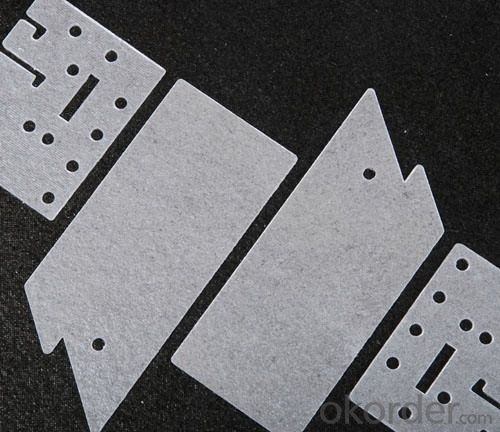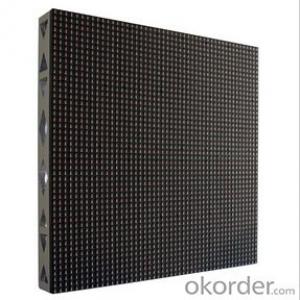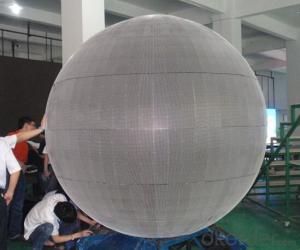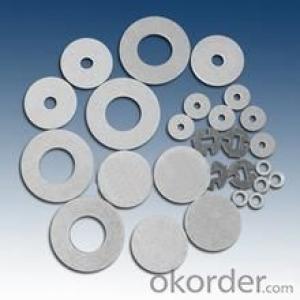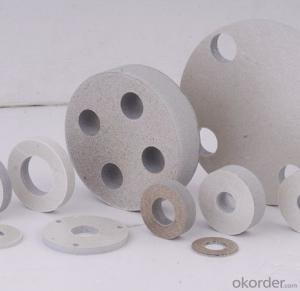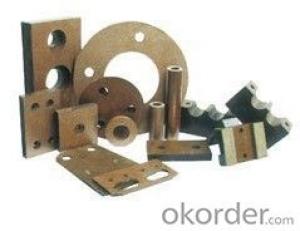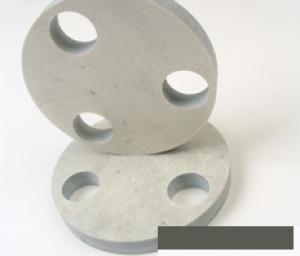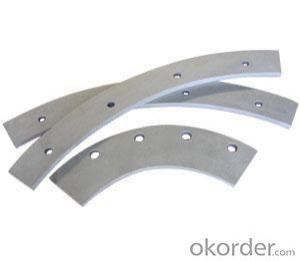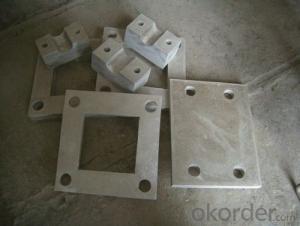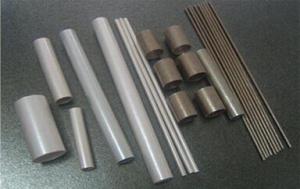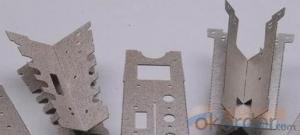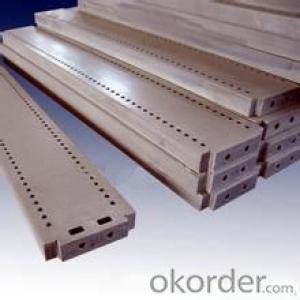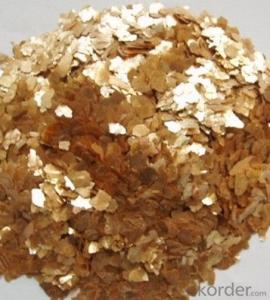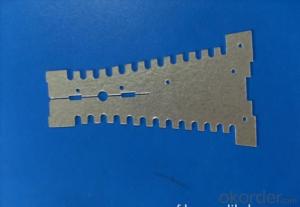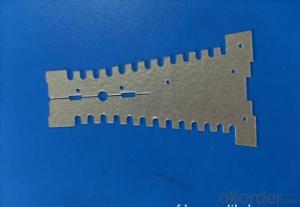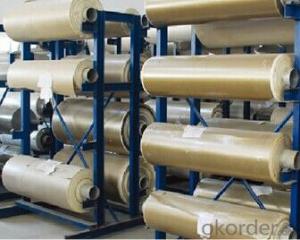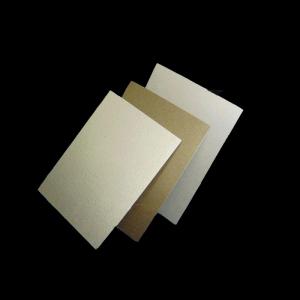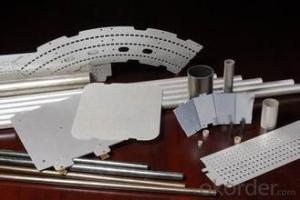Mica Parts Used in Refractory Industry Field
- Loading Port:
- Shanghai
- Payment Terms:
- TT OR LC
- Min Order Qty:
- 100 pc
- Supply Capability:
- 10000 pc/month
OKorder Service Pledge
OKorder Financial Service
You Might Also Like
1. Introduction:
Typical applications of mica heating elements are air heaters, enclosure systems, food service equipment, process and packaging equipment.
2. Main features of Mica Parts:
Mica is a rigid substrate able to withstand very high temperatures and are suited for applications up to 500°F (260°C).
Mica heating elements offer several distinct advantages over other flexible heater technologies, including extremely low leakage, lower material costs, and higher operating temperatures.
Our mica heating element is made by detail order requirments.
3. Technical Parameters:
MICA SHEET -----Technical data | ||||||||
ITEM | UNIT | RM | RP | RM-T | RP-T | FM | FP | |
Hardness |
| Rigid | Rigid | Rigid | Rigid | Flexible | Flexible | |
Mica paper |
| Muscovite | Phlogopite | Muscovite | Phlogopite | Muscovite | Phlogopite | |
Thickness | mm | 0.1-2.0 | 0.1-2.0 | 3.0-50 | 3.0-50 | 0.1-2.0 | 0.1-2.0 | |
Mica content | % | ≥90 | ≥90 | >88 | >88 | ≥90 | ≥90 | |
Bond Content | % | <10< span=""> | <10< span=""> | <12< span=""> | <12< span=""> | <10< span=""> | <10< span=""> | |
Density | g/m 3 | 1.6~2.45 | 1.6~2.45 | 2.1~2.4 | 2.1~2.4 | 1.6~2.45 | 1.6~2.45 | |
Heat | Continuous | ℃ | 500 | 700 | 500 | 700 | 500 | 700 |
Peak | ℃ | 700 | 900 | 700 | 900 | 700 | 900 | |
Heat loss at 500℃ | % | <1< span=""> | <1< span=""> | <1< span=""> | <2< span=""> | <1< span=""> | <1< span=""> | |
Heat loss at 700℃ | % | <2< span=""> | <2< span=""> | <1< span=""> | <2< span=""> | <2< span=""> | <2< span=""> | |
Flexural strength | Mpa | >160 | >140 | — | — | <1< span=""> | <1< span=""> | |
Water absorption 24h/23°C | % | <1< span=""> | <1< span=""> | <1< span=""> | <2< span=""> | — | — | |
Dielectric strength | KV/mm | >20 | >20 | >15 | >15 | >15 | >15 | |
Volume | 23℃ | ΩNaN | >1017 | >1017 | >1017 | >1017 | — | — |
500℃ | ΩNaN | >1012 | >1012 | >1012 | >1012 | — | — | |
Smoking Test | s | <4< span=""> | <4< span=""> | — | — | — | — | |
FAQ
We have organized several common questions for our clients,may help you sincerely:
--------What is the use of mica parts?
Mica laminate and washers made of our own high quality mica plates are used for home appliances, electro-magnets, micro-sensitive control gear etc
---------Which type of mica parts we can produce?
1. Rigid mica parts or Flexible mica parts
2. Muscovite mica parts or phlogopite mica parts
3. Thin mica parts or thick mica parts
4. All the special sized mica parts need drawing.
----------what advantages of mica parts?
1. Good high voltage insulation materials
2. Do not easily break up
3. Easily produce special size
- Q: The electrical equipment in the classroom which uses insulating material
- Insulation material description: Insulation material is electrical insulation material. According to the national standard GB2900.5 provides the definition of insulating material is: "used to make the device in the electrical insulation of the material." That is, to prevent the current through the material. Its resistivity is very high, usually in the range of 10 ^ 9 ~ 10 ^ 22Ω · m. As in the motor, the insulating material around the conductor isolates the turns and isolates it from the grounded stator core to ensure safe operation of the motor.
- Q: What is the electrical performance of insulating materials
- The electrical insulating material is a material that is electrically insulated from the device and has a certain mechanical strength, typically having a resistivity of 106 to 1019.cm. Their function in electrical technology is as follows: 1 Insulate the conductor from the other parts; 2 Separate the conductors of different potentials 3 Provide the conditions for the energy storage of the capacitor 4 Improve the potential gradient in the high voltage electric field.
- Q: Brass is not an insulating material?
- Brass is a particularly good conductive material and is a good material for wearing heat
- Q: What type of enameled wire and insulation material is used for the compressor
- Motor insulation class The insulation class is divided according to the permissible limit temperature of the insulation material used for the motor. There are Y, A, E, B, F, H, C and several other levels, the allowable limit temperature at all levels as shown in the table below. The so-called permissible limit temperature refers to the permissible maximum operating temperature of the motor insulation material, which reflects the heat resistance of the insulating material. Insulation material is divided into Y grade, A grade, grade E, grade B, grade F, grade H, grade C, permissible temperature (℃) 90,105,120,130,155,180, 180 ℃ or higher.
- Q: What insulating material is used for high voltage cables
- Etc., can withstand mechanical force and a certain tension. YJLV32 aluminum core XLPE insulated fine steel wire armored PVC sheathed power cable YJV33 copper core XLPE insulated fine steel wire armored PVC sheathed power cable YJLV33 aluminum core XLPE insulated steel tape armored PVC sheathed power cable
- Q: What insulating materials do you need for power tools?
- Additional insulation: insulation between the rotor core and the mandrel (insulating plastic powder), between the stator core and the plastic housing shell, is the additional insulation withstand voltage of 2500V;
- Q: What is the main purpose of insulating materials?
- Tensile strength: The cross-sectional area of the insulating material can withstand tensile forces, such as glass per square centimeter cross-sectional area can withstand the resistance of 1400 Newton.
- Q: What is the DMD insulation material?
- DMD (Dacron / Mylar / Dacron) full name polyester film polyester fiber non-woven soft composite foil, is a two-layer polyester non-woven fabric in the middle of a layer of insulated polyester film composite made of three insulation materials.
- Q: What are the commonly used insulating materials?
- Commonly used inorganic insulation materials are: mica, asbestos, marble, porcelain, glass, sulfur and so on, which can be divided into inorganic insulating materials, organic insulating materials and mixed insulating materials.
- Q: What is the thermal aging and electrical aging of insulating materials?
- Environmental aging, also known as atmospheric aging, is due to ultraviolet light, ozone, salt spray, acid and other factors caused by pollution of chemical aging, which is the main reason for ultraviolet light. Thermal aging more common in low-voltage electrical appliances, the mechanism is under the action of temperature, the insulating material in some volatile components escape, the internal components of oxidative cracking, thermal cracking, hydrolysis, molecular chain polymerization and other chemical changes, and gradually lose insulation properties.
Send your message to us
Mica Parts Used in Refractory Industry Field
- Loading Port:
- Shanghai
- Payment Terms:
- TT OR LC
- Min Order Qty:
- 100 pc
- Supply Capability:
- 10000 pc/month
OKorder Service Pledge
OKorder Financial Service
Similar products
Hot products
Hot Searches
